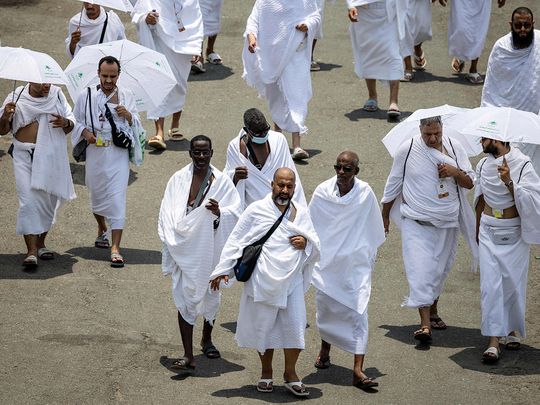
Riyadh: Saudi Arabia reported that over 1,300 pilgrims, mostly unauthorised, died due to extreme heat during the Hajj pilgrimage. Despite this tragedy, the Ministry of Health highlighted successful healthcare management with no epidemics and over 465,000 treatments provided.
"Regrettably, the number of mortalities reached 1,301, with 83 per cent being unauthorised to perform Hajj and having walked long distances under direct sunlight, without adequate shelter or comfort," the official Saudi Press Agency reported.
Saudi officials have said 1.8 million pilgrims took part this year, a similar number to last year, and that 1.6 million came from abroad.
Minister of Health Fahd Al Jalajel on Sunday announced the effective management of health services during the 2024 Hajj season, achieved through coordinated efforts between the health system and Hajj security forces. This ensured no outbreaks of epidemics or widespread diseases, with over 465,000 specialised treatments provided, including 141,000 to individuals without official Hajj authorisation.

Despite high temperatures at the Holy Sites, Al Jalajel expressed confidence in the overall health condition of pilgrims, praising swift responses from health authorities and support from Hajj security forces in managing and mitigating heat stress. However, 1,301 fatalities were recorded, predominantly among unauthorised pilgrims who endured harsh conditions without adequate shelter, including elderly and chronically ill individuals.
Al Jalajel emphasised ongoing efforts to raise awareness about heat stress dangers and expressed condolences to affected families. He noted meticulous procedures for identifying and honoring the deceased, despite initial challenges in obtaining personal information or identification documents.
Read more
- Saudi Arabia: 1.4 million pilgrims visit Al Rawda Al Sharifa in Hajj season
- Egypt revokes licences of 16 travel agencies over Hajj deaths
- Registration in UAE for Hajj 2025 to start in September 2024
- Next year marks last Hajj during intense summer heat, relief from extreme temperatures for the next 17 years: Official
- Watch: Showers bring relief for Hajj pilgrims as rain falls on holy sites of Saudi Arabia
Saudi Arabia provided free health services to pilgrims even before their arrival, with awareness programs at air, sea, and land borders. Approximately 1.3 million preventive services were delivered, including early detection, vaccinations, and medical care upon arrival.
Healthcare services during Hajj included advanced treatments such as open-heart surgeries, cardiac catheterizations, dialysis, and emergency care, supported by over 30,000 ambulance services and 95 air ambulance operations across medical cities in the Kingdom. Nearly 6,500 beds and rooms were made available, alongside measures to combat heat stress through rapid rescue devices.









